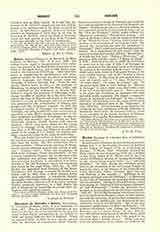

Herbst, JOHANN GEORG, b. at Rottweil, in Wurtemberg, January 13, 1787; d. July 31, 1836. His college course, begun in the gymnasium of his native city, was pursued in the Benedictine monastery of St. Peter in the Black Forest, and in 1806 Herbst registered at the University of Freiburg. After some time spent in completing his mathematical and philosophical studies, he devoted his talents to mastering Oriental languages and Biblical science under the tutorship of Johann Leonard Hug. From the university Herbst went, in 1811, to the seminary of Meersburg, to prepare himself for Holy orders, and was ordained to the priesthood in March, 1812. Called at once to the seminary of Ellwangen to discharge the office of repetent, he at the same time accepted the chair of Hebrew and Arabic at the newly-erected University of Ellwangen, and, two years later, was promoted to the professorship of Oriental languages and Old Testament exegesis. In 1817 the theological faculty of Ellwangen was transferred to Tubingen, and there, in addition to the courses already entrusted to him, Herbst taught introduction to the Holy Scriptures and Biblical archaeology; he also occasionally was prevailed upon to lecture on New-Testament exegesis, church history, and pastoral theology. Those were heroic times for the young faculty of theology, which, with such men as Sebastian Drey, J. B. Hirscher, and Mohler on its staff, and pupils of the stamp of J. C. Hefele, was rapidly winning a conspicuous place in the realm of scholarship.
What the intellectual activity of Herbst was amidst his manifold occupations as a professor, may be gathered from his works. His first publication was a volume entitled: “Observationes quaedam de Pentateuchi quatuor librorum posteriorum auctore et editore” (Gmund, 1817). From the foundation, in 1819, of the Tubingen “Theol. Quartalschrift”, he was a steady contributor thereto; but his principal work, left unfinished, and perhaps slightly tainted by the then prevalent tendencies to rationalism, is an introduction to the Old Testament, which was completed and edited by his pupil Welte (1841-44). In 1832 Herbst was appointed head librarian of the Royal University; but through overwork his health soon failed, and he died after a short sickness borne with admirable resignation. A remarkable linguist, thoroughly conversant with the vast literature of his favorite studies, endowed with true critical acumen, Herbst possessed, moreover, in a high degree, the gift of imparting his knowledge in a most clear, attractive, and appealing manner.
CHARLES L. SOUVAY

